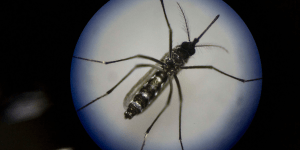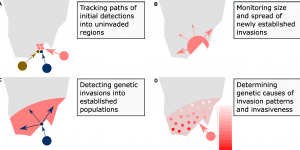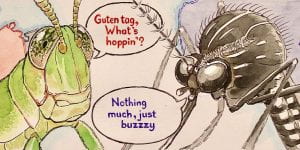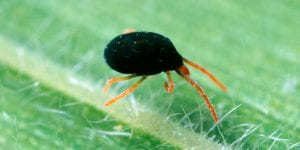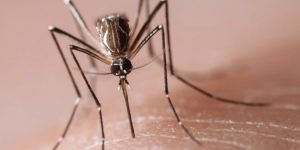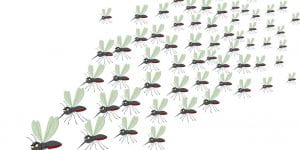Tag: Aedes
-
Scientists and government agencies are targeting mosquitoes with bacteria
by Nancy Endersby-Harshman and Ary Hoffmann This article was first published on Pursuit. Read the original article Dengue fever is one of the most common tropical diseases in the world, affecting several million people every year. It is transmitted by mosquitoes, particularly a species known as Aedes aegypti, the yellow fever mosquito. Dengue is a […] -
Q&A: Victoria’s monster mosquito explosion
By Véronique Paris, Nick Bell and Professor Ary Hoffmann This article was first published on Pursuit. Read the original article. It’s evening and you’re just starting to relax after a hectic day. Just as you do, you hear the unmistakable high whine of a circling mosquito. It’s something most of us are used to in […]blogs.unimelb.edu.au/pearg/2022/11/24/qa-victorias-monster-mosquito-explosion
-
Dengue-blocking mosquitoes here to stay
This article was first published on Pursuit. Read the original article. Dr Perran Stott-Ross Story Producer: Nerissa Hannink Dengue fever and other mosquito-borne diseases remain a massive threat to human health and wellbeing. Urbanisation and climate change are likely to increase this threat as established mosquitoes spread to new environments and gain a foothold. Eradicating […]blogs.unimelb.edu.au/pearg/2022/04/12/dengue-blocking-mosquitoes-here-to-stay
-
Improving mosquito control strategies with population genomics
Words: Tom Schmidt When researchers want to investigate evolutionary processes like adaptation and dispersal, they frequently make use of population genomic methods. Population genomics uses DNA data from across an organism’s entire genome – that is, across all of that organism’s DNA. This DNA data can be compared with DNA from other organisms, which can […]blogs.unimelb.edu.au/pearg/2021/06/28/improving-mosquito-control-strategies-with-population-genomics
-
New Pursuit article – Have resistance, will travel
This article was first published on Pursuit. Read the original article here. Authors: Dr Nancy Endersby-Harshman, Dr Qiong Yang, Dr Tom Schmidt and Professor Ary Hoffmann Around the world, pest insects – like mosquitoes – often become resistant to the insecticides meant to control them, causing problems for agriculture and public health. Resistance in multiple populations […]blogs.unimelb.edu.au/pearg/2020/05/28/new-pursuit-article-have-resistance-will-travel
-
Dengue-blocking bacteria endure the heat
“This article was first published on Pursuit. Read the original article.” Dr Perran Stott-Ross and Professor Ary Hoffmann Bushfires. Coral bleaching. Heatwaves. These disastrous events are a harsh reality in Australia. And they’re only going to become more frequent and severe with climate change. Last year, 2019, was Australia’s hottest year ever recorded, and records […]blogs.unimelb.edu.au/pearg/2020/01/24/dengue-blocking-bacteria-endure-the-heat
-
Wolbachia infections in Aedes aegypti: The ‘Bigfoot’ of endosymbionts
Words: Perran Ross Wolbachia are endosymbiotic bacteria found within the cells of many insects, from butterflies and bees to cockroaches and dung beetles. Wolbachia are so common because they often provide their insect hosts with an advantage, aiding their spread through populations. Whether an insect carries Wolbachia is an important question, especially if they’re a […] -
Sampling by the sea – collecting mosquitoes in the Mornington Peninsula
Words and images: Véronique Paris It’s 7.30 Saturday morning – what are your plans for the day? While you may be still in bed contemplating a coffee, or still sound asleep, I’m packing the PEARG ute with a stack of small buckets, strips of red felt, some rabbit food, and a 20lt jerrycan of water. […] -
Variability in mosquito host-seeking ability
Words and images: Meng-Jia Lau Behaviour is one of the most complex study areas in biology because it involves a combination of many factors that are often quite variable. In mosquitoes, host-seeking is the behaviour of females seeking a blood meal which provides the extra protein they need in order to lay eggs. The biting […]blogs.unimelb.edu.au/pearg/2019/11/28/variability-in-mosquito-host-seeking-ability
Number of posts found: 21
